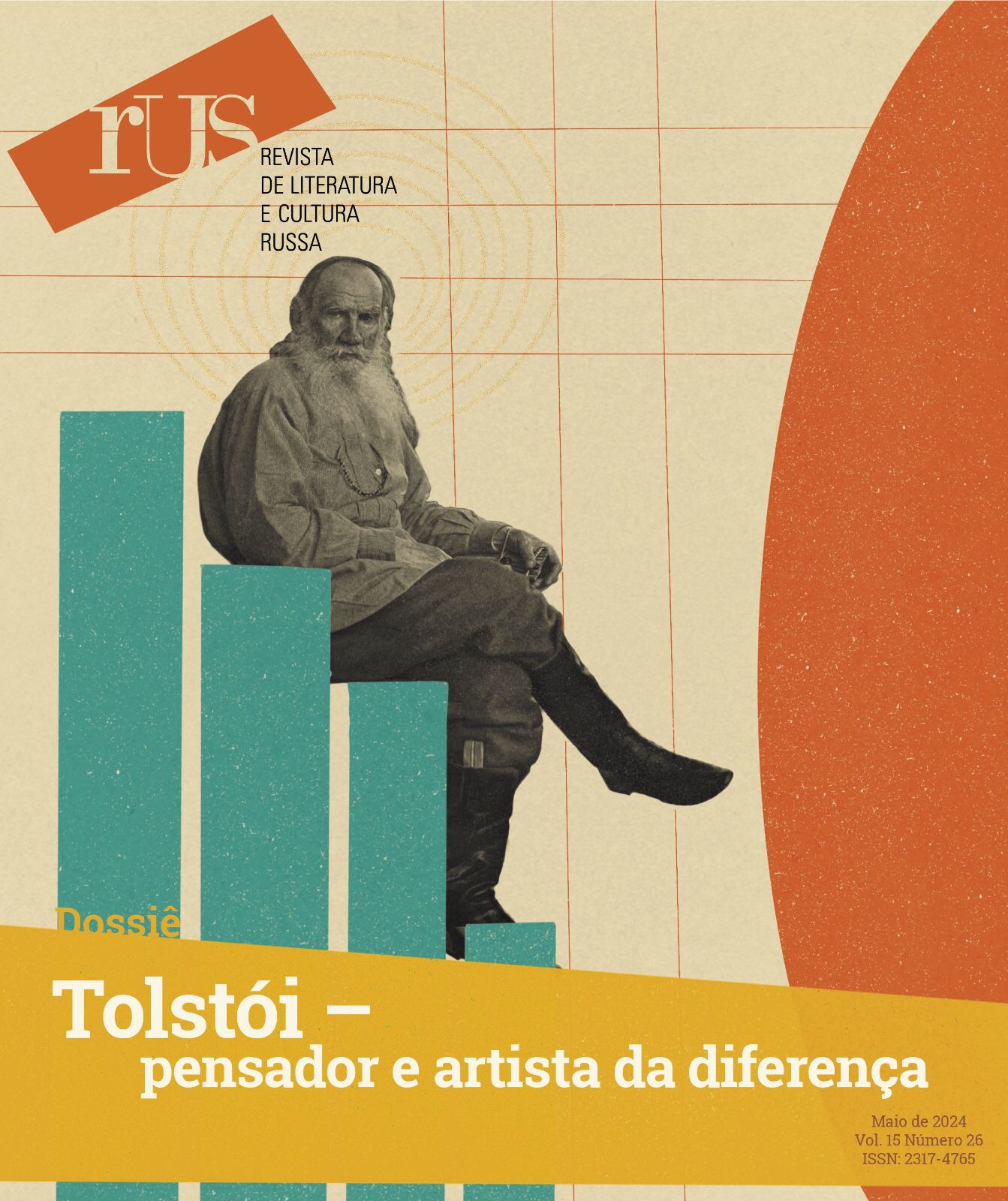Tolstói e a sexualidade feminina: uma análise das personagens femininas em Felicidade Conjugal, Anna Kariênina e A Sonata a Kreutzer
DOI:
https://doi.org/10.11606/issn.2317-4765.rus.2024.222539Palavras-chave:
Liev Tolstói, Gênero e Literatura, Felicidade Conjugal, Anna Kariênina, A Sonata KreutzerResumo
O tema do adultério e da sexualidade feminina perpassa boa parte da obra de Liev Tolstói, cuja visão acerca da posição da mulher na sociedade pode ser associada, também, à sua concepção de arte. Não à toa, no seu polêmico ensaio O que é a Arte? (1898), ele se vale de uma analogia com as mulheres para elucidar sua visão. Assim, pensar a figura feminina parece ser central na constituição de sua obra. Tendo isso em vista, propõe-se uma análise das principais personagens femininas de três de suas obras em que essa problemática da sexualidade feminina se faz presente, Felicidade Conjugal (1859), Anna Kariênina (1878), e A Sonata a Kreutzer (1889). Com isso, busca-se recuperar a maneira como Tolstói representava as mulheres em suas narrativas, bem como destacar as implicações dos diferentes recursos literários adotados em cada obra no que se refere às representações construídas.
Downloads
Referências
ARMSTRONG, Judith. The Unsaid Anna Karenina. London: Macmillan, 1988.
BAKHTIN, Mikhail. Problemas da poética de Dostoiévski. Tradução de Paulo Bezerra. 2 ed., Rio de Janeiro: Forense Universitária, 1977.
CRUISE, Edwina. Women, sexuality, and the family in Tolstoy. In: ORWIN, Donna Tussing (ed.). The Cambridge Companion to Tolstoy. Cambridge University Press, 2002.
CUNHA, Juliana. O pulo de Anna Kariênina. Revista Cult. 3 de set. de 2021. Disponível em: https://revistacult.uol.com.br/home/o-pulo-de-anna-karienina/. Acesso em: 03/11/2022.
DAME, Natalia. The Search for Narrative Control: Music and Female Sexuality in Tolstoy’s “Family Happiness” and “The Kreutzer Sonata.” Ulbandus Review, vol. 16, p. 158–76, 2014. JSTOR. Disponível em: http://www.jstor.org/stable/24391989. Acesso em 21 fev. 2024.
FONSECA FILHO, Odomiro Barreiro. Niilismo: estrada para a emancipação. O destino literário das personagens femininas russas na época das grandes reformas (1855-1866). 2017. Tese (Doutorado) – Faculdade de Filosofia, Letras e Ciências Humanas, Universidade de São Paulo, São Paulo, 2017.
FREUD, Sigmund. A interpretação dos sonhos. vol.2. Porto Alegre, RS: L&PM, 2013.
FRIEDMAN, Norman. O ponto de vista na ficção. Tradução de Fábio Fonseca de Melo. Revista USP. São Paulo, n.53, p.166-182, março/maio, 2002.
HERMAN, David. Stricken by Infection: Art and Adultery in Anna Karenina and Kreutzer Sonata. Slavic Review, vol. 56, n. 1, p. 15–36, 1997, JSTOR, https://doi.org/10.2307/2500653. Disponível em: https://www.jstor.org/stable/2500653. Acesso em: 22 fev. 2024.
HERNDL, Diane Price. The Dilemmas of a Feminine Dialogic. In: BAUER, Dale M. e MCKINSTRY, Susan Jaret (ed.). Feminism, Bakhtin, and the Dialogic. Albany: State University of New York Press, 1991.
MANDELKER, Amy. Framing Anna Karenina: Tolstoy, Women Question, & Victorian novel. Ohio State University, 1993. Disponível em: https://ohiostatepress.org/books/Complete%20PDFs/Mandelker%20Framing/Mandelker%20Framing.htm.
MCLEAN, Hugh. A Woman’s Place: The Young Tolstoy and the “Woman Question.” In: In Quest of Tolstoy, Boston: Academic Studies Press, 2008, p. 105–116.
PEREIRA, Ellen Torres. A formação humana na literatura: A desigualdade da mulher na obra “Felicidade Conjugal” de Lev Tolstói. 2022. Dissertação (Mestrado) – Faculdade de Educação da Universidade Federal de Goiás, Goiânia, 2022.
SILVA, Noé. Três imagens da mulher em Ressurreição. Revista Fragmentos, v. 21, p. 39-50, 2010. Disponível em: https://periodicos.ufsc.br/index.php/fragmentos/article/view/30455. Acesso em: 03/06/2022.
STEINER, George. Tolstói ou Dostoiévski: um ensaio sobre o Velho Criticismo. Tradução: Isa Kopelman. São Paulo: Perspectiva, 2006.
STITES, Richard. The Women’s Liberation Moviment in Russia; Feminism, Nihilism and Bolshevism. Princeton University Press. New Jersey: 1967.
TOLSTÓI, Liev. Anna Kariênina. Tradução: Rubens Figueiredo. São Paulo: Cosac Naify, 2013.
TOLSTÓI, Lev. A sonata a Kreutzer. Tradução e posfácio: Boris Schnaiderman. São Paulo: Editora 34, 2010a.
TOLSTÓI, Lev. Felicidade Conjugal. Tradução: Boris Schnaidermann. São Paulo: Editora 34, 2010b.
TOLSTÓI, Leon. O que é a Arte?. São Paulo: Experimento, 1994.
WILLIAMS, Raymond. Tragédia social e pessoal: Tolstói e Lawrence. In: WILLIAMS, Raymond. Tragédia moderna. Trad. Betina Bischof. São Paulo: Cosac & Naify, 2002. p. 161-182.
Downloads
Publicado
Edição
Seção
Licença
Copyright (c) 2024 Julia Ferrari Duarte do Páteo

Este trabalho está licenciado sob uma licença Creative Commons Attribution-NonCommercial-ShareAlike 4.0 International License.
Os autores que publicam na RUS concordam com os seguintes termos:
a. Os autores mantém os direitos autorais e concedem à revista o direito de primeira publicação, com o trabalho simultaneamente licenciado sob a Licença Creative Commons Atribuição 4.0 Internacional (CC BY-NC-SA) que permite o compartilhamento do trabalho com reconhecimento da autoria e publicação inicial nesta revista.
b. Os autores têm autorização para assumir contratos adicionais separadamente, para distribuição não-exclusiva da versão do trabalho publicada nesta revista (ex.: publicar em repositório institucional ou como capítulo de livro), com reconhecimento de autoria e publicação inicial nesta revista.
c. Os autores têm permissão e são estimulados a publicar e distribuir seu trabalho online (ex.: em repositórios institucionais ou na sua página pessoal) a qualquer ponto antes ou durante o processo editorial, já que isso pode gerar alterações produtivas, bem como aumentar o impacto e a citação do trabalho publicado (Veja O Efeito do Acesso Livre).
Como Citar
Dados de financiamento
-
Fundação de Amparo à Pesquisa do Estado de São Paulo
Números do Financiamento 2023/04236-0





